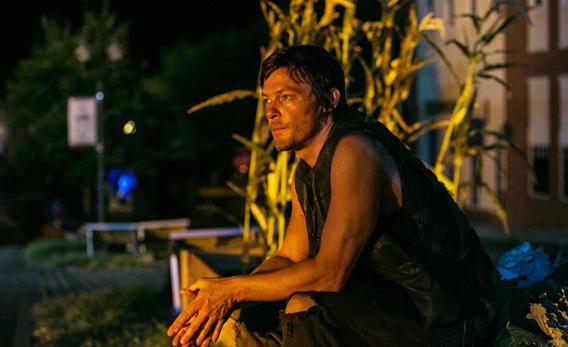There’s one question reviewers and critics have been asking since a Woodsbury shooter dispatched Oscar in last night’s midseason finale of The Walking Dead: Seriously?
“It now is a weird and silly thing on the part of The Walking Dead writers, as they are indeed in the habit of killing off their current black, male character once a new black, male character is introduced,” writes Eric Goldman of IGN. “I’d seen multiple people on the boards joke that Oscar was going to die once Tyrese was introduced, and it was pretty ridiculous and sigh-worthy when that’s exactly what happened.”
“It’s like Highlander—there can be only one!” gibed Slate commenter Geoff.
And Michonne’s stark refusal to say anything, instead engaging Andrea in a glowering contest, again miffed viewers.
“At what point will Michonne learn to use her words?” wrote Slate commenter Formyle. “The standoff with Andrea could have been resolved with a quick ‘He sent Merle to kill me, so I came back to kill him. Your old pals Rick and Daryl are attacking to free Glenn and Maggie, who Merle kidnapped.’ “
“It was at LEAST worth a try,” writes Jon Lachonis of TV Overmind. It seems likely that Andrea would at least hear her out; Andrea trusted Michonne long before she trusted the governor. Perhaps Michonne thought time was too short to explain all that had transpired.
Still, we’ve already become accustomed to these problems, and, despite them, last night’s episode dropped the dominoes quite effectively and demonstrated again how this show has so summarily closed the gap between its production value and its story value. As Alan Sepinwall of Hitfix writes, “The zombies are almost besides the point now.”
“By using the zombies not as primary antagonists, but as the inciting incident forcing all these people to make hard—at times monstrous—choices, The Walking Dead has become a much more morally complicated show, in addition to remaining one that’s great at action and suspense,” Sepinwall writes. No one can doubt that after the nail-biting fight between Michonne and the Governor, which handedly outdoes any other tussle in the show’s history.
Like any good finale, the episode’s emotional moments matched its deftly executed suspense, showing viewers that even though the show spends less and less time unwinding Rick and Carl’s psyches, Lori’s death is still raw for them both. For Rick, an unexpected hallucination of Shane shows that his vision quest in the prison did not expunge his guilt, and Oscar’s death reminds us that his psychosis doesn’t sit in a display case for us to examine but as a serious liability to his group. For Carl, Lori’s death has transformed him into a stoic native of this apocalyptical world. “He’s a proper child soldier now, and while I applaud how bad-ass he’s become, it’s still a bit unnerving,” writes Eric Kain of Forbes. Unnerving indeed. Whereas Rick childishly goes off the deep end in his self-loathing and grief, Carl, the actual child, appears detached, almost uncaring. A coolness, even remorselessness, tinges everything he does with Tyrese’s group: demanding that Tyrese’s group finish off their bitten companion, locking Tyrese’s people in an adjacent cell, standing composedly as one of Tyrese’s survivors excoriates him through the bars. His business-like handling of these wretched people seems unfitting for a boy who should be reading Harry Potter or listening to Justin Bieber or doing whatever tweens do these days. But your average tween hasn’t watched his mother’s agonizing death and his father’s subsequent derailment.
Carl has adapted so well, in fact, that it’s disturbing, maybe more so than zombie heads in fish tanks. You can cut up this show in a lot of ways. Maybe it’s about the Holocaust. Considering the governor’s comments last night, maybe it’s about terrorism. Maybe it’s about how the pressure to survive determines how individuals and groups interact and conflict. It’s probably about all of these things and more, but the most resonant aspect of this show to me is trauma and how people respond to it. Do they adapt, like Shane and Carl? Do they blame themselves, like Rick? Or do they blame God and clutch desperately to what once was, reach for unscrupulous power, and try hopelessly to raise the dead — like the Governor? Each response allows an individual to endure, unlike Jacqui, but each has its own price. For Carl, it’s innocence. For Rick, it’s his leadership. For the Governor, it’s sanity.
This has been a great season by any measure. The show is not only more entertaining, it feels more realistic than it used to, if that means anything for a show about zombies; Rick’s group spends less time housekeeping and more time struggling for survival. Major characters die unexpectedly. Above all, the writers seem more adept at staging conflict. The zombies are less dangerous, but the apocalypse itself is more dangerous as the dust settles and the surviving tribes of humanity struggle to survive and rebuild. In a few episodes, the show turned itself from a nauseating stew of inconsistencies and banalities into everything I’d hope a zombie show should be. The Walking Dead is now brutal and bizarre and actually good TV, and it’ll be a long wait to see how the rest of the season will unfold starting in February.
